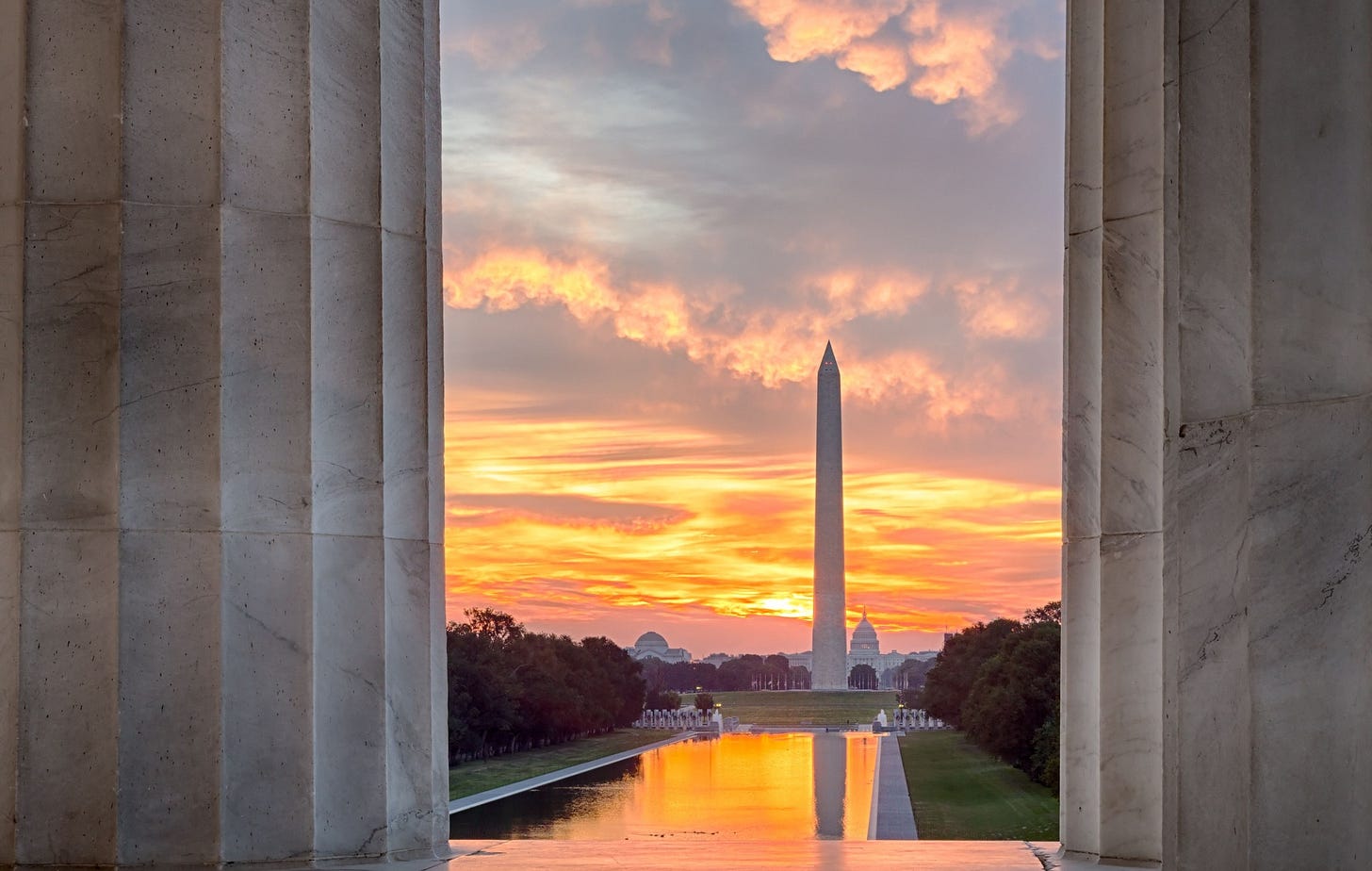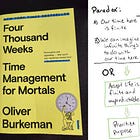Is There Hope In Politics?
Let’s start change with ourselves; societal flourishing doesn’t come from politics.
There is still time to get on board for our deep dive into how we use time, which begins Saturday at Mindset Shifts U.
Later in 2025, we will work with essays by Ralph Waldo Emerson. Emerson was a classical liberal, an optimist, and a champion of the potential in each of us. The only pessimistic essay I have read by Emerson is “Politics,” which the following essay originally published at the American Institute for Economic Research is based on.
Can bureaucracy be made useful by better bureaucrats or only restrained by the resurgence of individual choice?
If confirmed as Secretary of Health and Human Services, will Robert Kennedy Jr. successfully challenge bureaucratic-corporate collusion and reawaken a competitive market?
The building blocks of ultra-processed food — corn, wheat, soybeans, and sugar — are subsidized by the US Department of Agriculture to the tune of about $6 billion dollars per year. High-calorie food loaded with cheap soybean oil and sweeteners appears cheaper than they are relative to more nutritious and less calorie-dense foods. The magnitude of the impact on consumer choice is unclear, but here is one thing we can count on: If Kennedy, with the backing of the Trump administration, goes after subsidies, lobbyists for corn, wheat, soybeans, and sugar will turn Congress upside down to thwart him.
Many might wish it were different, but crony firms will continue to exist during Trump’s presidency. The success of his presidency will hinge, in part, on his ability to break longstanding government alliances with crony firms and resist new calls for corruption.
Let’s ask the big question. Can genuine change be achieved through political means?
In his classic book The State, the late German sociologist Franz Oppenheimer observed two ways to wealth: the peaceful “economic means” and the coercive “political means.” Non-coercive wealth creation is an economic process where businesses and people fulfill consumer needs. Wealth through political maneuvering involves firms and individuals using government power to obtain unearned riches. According to Oppenheimer, economic means demand “work,” unlike political means, which demand “robbery.”
In “Profit and Loss,” Ludwig von Mises reflected on how the “ballot of the market” forces entrepreneurs into an endless process of working to serve consumers: “The ballot of the market elevates those who in the immediate past have best served the consumers.”
Unlike politics, in a market process, people freely and easily change their minds. Mises added, “Choice is not unalterable and can daily be corrected. The elected who disappoints the electorate is speedily reduced to the ranks.”
Some businesses, unable or unwilling to adapt and serve, rely on the government to restrict consumers’ choices as a means to gain profits they could not have earned otherwise. Rather than compete to win the “election” in the “ballot of the market,” they seek to elect politicians who will support their schemes to forcibly appropriate the wealth of others, and that is robbery.
Oppenheimer’s choice of the word robbery wouldn’t have surprised Ralph Waldo Emerson.
In his essay Politics, Emerson wrote, “Every actual State is corrupt.” He then added, “What satire on government can equal the severity of censure conveyed in the word politic, which now for ages has signified cunning, intimating that the State is a trick?”
Emerson was writing in 1844 when the government was a tiny fraction of the size it is now. The exact size of the federal budget in 1844 was hard to come by, but in 1837 the budget was approximately $39 million dollars. (Or roughly $1.6 billion in 2024, since the dollar has lost 98 percent of its value since 1844.) Federal spending in fiscal year 2024 is around $6.75 trillion.
In short, Federal spending in 1844 was about 0.024 percent of what it is today. But, if Emerson is right, politics had already become irredeemable.
Emerson observed, “Of all debts, men are least willing to pay the taxes. What a satire is this on government! Everywhere they think they get their money’s worth, except for these.” Remember, there was no federal income tax in 1844.
Emerson railed against taxes: “A man who cannot be acquainted with me, taxes me; looking from afar at me, ordains that a part of my labor shall go to this or that whimsical end, not as I, but as he happens to fancy.”
Emerson was clear: “The less government we have, the better — the fewer laws, and the less confided power.”
Similar to other classical liberals, Emerson advocated for voluntary cooperation to solve mutual problems:
Whilst I do what is fit for me, and abstain from what is unfit, my neighbor and I shall often agree in our means, and work together for a time to one end. But whenever I find my dominion over myself not sufficient for me, and undertake the direction of him also, I overstep the truth, and come into false relations to him.
Those who used coercion met with Emerson’s disapproval. He always advised working towards “self-control.” It was wrong “to make somebody else act after [our] views.” When others “tell me what I must do” their commands are absurd. “Therefore,” Emerson wrote, “all public ends look vague and quixotic beside private ones.”
Wisely, Kennedy should consider those words, ending subsidies while preserving consumer choice. But removing self-seeking interest from government power may be among the most quixotic goals we could undertake. Can Leviathan restrain itself?
Instead of demanding government solutions, Emerson expected us to attend to our spiritual growth: “The antidote to this abuse of formal Government is the influence of private character, the growth of the Individual.”
You cannot change an effect without changing its cause. The consciousness of Americans is the cause; government robbery and overspending are the effects.
Emerson wrote: “Cause and effect, means and ends, seed and fruit, cannot be severed.” He argued we need “a reliance on the moral sentiment, and a sufficient belief in the unity of things to persuade [people] that society can be maintained without artificial restraints.”
Do we get upset at the behavior of politicians? It’s unwise to be angry about the predictable. Emerson chided, “We might as wisely reprove the east wind, or the frost, as a political party, whose members, for the most part, could give no account of their position, but stand for the defense of those interests in which they find themselves.”
Emerson would agree with the old saying, we get the government we deserve. He said, “The State must follow, and not lead the character and progress of the citizen… the form of government which prevails, is the expression of what cultivation exists in the population which permits it.”
Individual spiritual evolution is a prerequisite for political change. Emerson wrote, “Under the dominion of an idea, which possesses the minds of multitudes… the powers of persons are no longer subjects of calculation. A nation of men unanimously bent on freedom… can easily confound the arithmetic of statists.”
In 1837, Emerson spoke to the Phi Beta Kappa Society at Harvard. It was later published as The American Scholar. He ended his talk with a rousing call to stand for principles and not cave to expediency. He warned, “The spirit of the American freeman is already suspected to be timid, imitative, tame. Public and private avarice make the air we breathe thick and fat.”
Emerson, of course, couldn’t have imagined how much avarice would bloat government and make our political discourse “thick and fat.” The consequences are severe when private interests exploit political processes for theft.
Some people, Emerson said, “very naturally seek money or power; and power because it is as good as money — the ‘spoils,’ so called, ‘of office.’” Such people are “sleep-walking.” Emerson advised, “Wake them, and they shall quit the false good and leap to the true, and leave governments to clerks and desks.”
Emerson knew the choice to awaken is a choice made by an individual.
Is political change a realistic hope? Let’s start change with ourselves; societal flourishing doesn’t come from politics. The time to begin is now. For, as Emerson reflected, “This time, like all times, is a very good one, if we but know what to do with it.”






There is hope in us:
“For, in a democracy, every citizen, regardless of his interest in politics, 'holds office'; every one of us is in a position of responsibility; and, in the final analysis, the kind of government we get depends upon how we fulfill those responsibilities. We, the people, are the boss, and we will get the kind of political leadership, be it good or bad, that we demand and deserve.” —John F. Kennedy
Found that quote here: https://oldschoolcounselor.substack.com/p/the-revolution-for-truth-and-common
Thanks Barry, clear presentation.
"You cannot change an effect without changing its cause. The consciousness of Americans is the cause; government robbery and overspending are the effects."
Agreed, but why is coercion such a large part of our mentality? The root issue may be our widely shared split model of reality. This has been great for analysis and oligarchs. Not so great for the rest of us as it splits our psyche's and makes relationship with the 'spiritual' more difficult. Another option might be to declare the spiritual, (subtle) and the physical (manifest) to be fundamentally similar. Then, we might have a relationship based model, rather than the object based model now in use. At that point, we may more easily see that the 'spiritual' is simply the responsible use or application of free will. More encouragement toward self improvement. No telling what might develop from that.